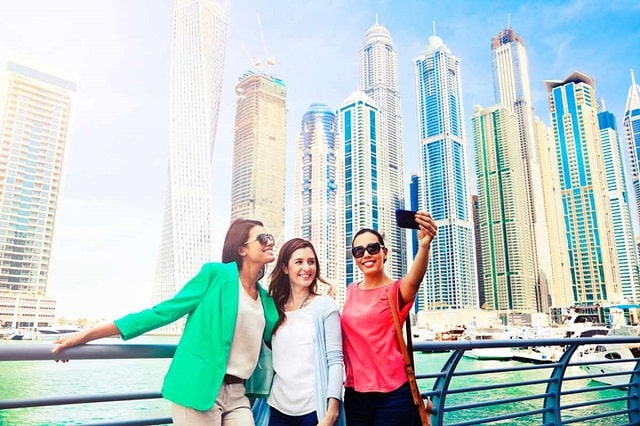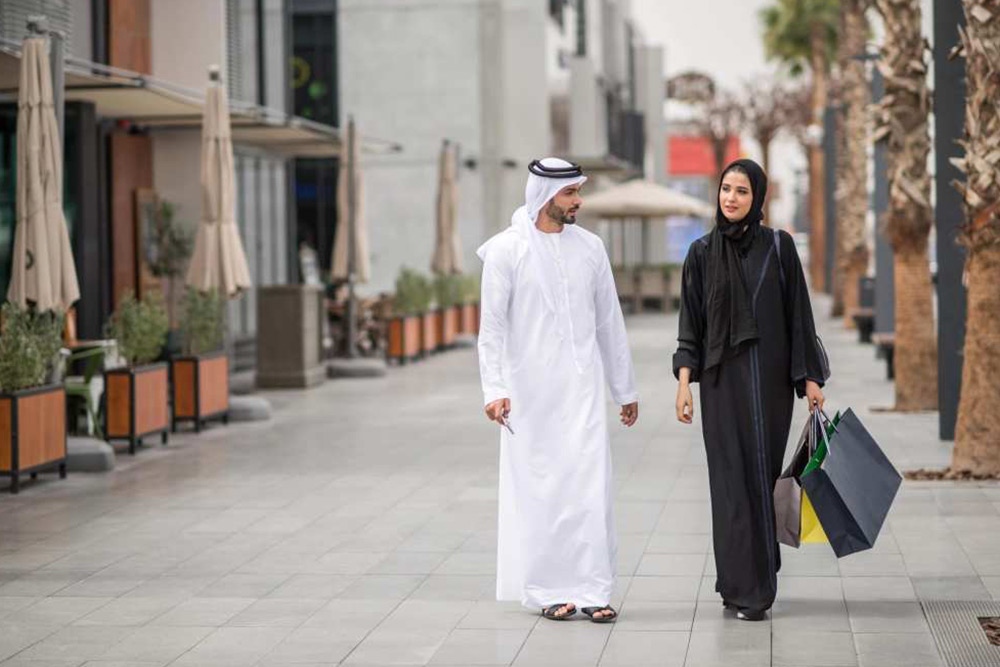The United Arab Emirates (UAE) is a fascinating destination that blends modernity with deep-rooted traditions. Known for its luxurious cities like Dubai and Abu Dhabi, towering skyscrapers, and beautiful beaches, the country also boasts a rich cultural heritage. Given that the UAE is a global hub attracting millions of tourists every year, it is important for travelers to respect and understand local customs to ensure a respectful and enjoyable experience.
Like many Middle Eastern countries, the UAE has cultural practices and laws influenced by Islamic traditions and values. While the country is generally very welcoming and open to tourists, it is essential to be mindful of certain behavioral expectations. This comprehensive guide covers all aspects of cultural etiquette in the UAE, from appropriate dress and public behavior to religious and social customs, so you can visit the country with awareness and respect.
What you read in this article:
Understanding the Cultural Context of the UAE
Understanding the cultural context of the United Arab Emirates is crucial for travelers, especially given the country’s unique cultural and religious characteristics. Here are some key points about the cultural context and local etiquette in the UAE:
- Islamic Influences:Islam, as the official religion of the UAE, profoundly impacts the country’s laws and social customs. Islamic principles are evident in all aspects of social life, including public behavior, dress code, and social interactions. For example, during the holy month of Ramadan, fasting from dawn until sunset is required, and eating, drinking, and smoking in public places are generally unacceptable.
- Respect for Family Values:Family holds a very important role in Emirati culture, and family-related customs are highly respected. Respecting parents and elders is very important and is reflected in daily interactions and public behavior. Disrespecting these values can be particularly noted and frowned upon.
- Dress Code and Grooming:Appropriate dress is a key requirement in the UAE. Women should wear modest and non-tight clothing, covering shoulders and knees. For men, wearing long trousers and a shirt that is somewhat covered is necessary. Adhering to these dress codes is especially important in religious and formal settings.
- Behavior in Religious Places:Mosques and other religious sites in the UAE are held in high regard. When visiting these places, specific rules and etiquettes must be followed, such as removing shoes before entering and dressing modestly. Additionally, loud talking and making noise in these places should be avoided.
- Social and Legal Norms:Several social and legal behaviors in the UAE might be unfamiliar to travelers. For instance, alcohol consumption is permitted only in licensed venues and under specific regulations, and smoking is prohibited in many public areas. The use of drugs is strictly banned and carries severe penalties.
- Interacting with Locals:Courtesy and respect are essential when interacting with locals. Using polite language and body language, as well as respecting others’ personal space, is very important. Being mindful of cultural and religious sensitivities and avoiding questions or behaviors that might be considered intrusive is also crucial.
- Modern and Traditional Features:The UAE, especially cities like Dubai and Abu Dhabi, is known for its skyscrapers and modern amenities, yet traditional customs and local culture remain a significant part of daily life. Familiarizing yourself with this blend of modernity and tradition can help you have a more balanced and comprehensive travel experience.
- Hospitality:Polite behavior and respect for local culture demonstrate your appreciation of Emirati hospitality. The people of the UAE are generally welcoming and friendly, and showing appreciation for their culture and customs can lead to a more positive and enjoyable travel experience.
Adhering to these guidelines will help you engage with the local culture respectfully and have a pleasant experience while traveling in the UAE.

Dress Code Etiquette
Appropriate dress in the United Arab Emirates is a key aspect of respecting the local culture and is particularly important in public and religious places. Here are more details about the dress code etiquette in this country:
- Women’s Dress Code:Public Areas:
- Modest Dress: Women are generally expected to dress modestly. Shoulders and knees should be covered. Short or tight clothing, especially in public areas, is not recommended.
- Abaya: Although non-Muslim women are not required to wear an abaya (a traditional black cloak), modest and conventional attire is especially expected in religious and traditional areas. An abaya may be considered a sign of respect in religious places.
- Swimwear: In resorts and private beaches, wearing swimwear is allowed. However, after leaving these areas, women should return to modest dress and avoid wearing revealing or inappropriate clothing in public places.
- Men’s Dress Code:Public Areas:
- Appropriate Attire: Men should avoid wearing very casual clothing like shorts and tank tops in public spaces. Long trousers and more covered shirts are recommended.
- Formal Wear: For formal occasions and places where more respect is needed, men should wear formal and appropriate attire.
- Full Coverage: In religious places, men should wear long trousers and avoid shorts and very casual clothing. Additionally, men should refrain from wearing clothing with provocative patterns or designs that could be considered offensive.
- In Religious Places:For Women:
- Headscarf: Women should cover their hair with a headscarf. This is especially required in mosques and religious sites.
- Appropriate Attire: Women’s clothing should cover the shoulders and legs completely, and short or tight clothing should be avoided.
- Full Coverage: Men should also avoid wearing shorts and casual clothing, opting instead for long trousers and covered shirts.
- Respect for Local Culture:
- Dress in Public Spaces: Even in tourist areas and hotels, maintaining appropriate and modest dress is a sign of respect for the local culture. This is particularly important in public and open spaces.
- Cultural Sensitivity: Proper attire reflects your respect for the cultural norms of the host country and can help in establishing friendly and positive relations with locals.
- Variations in Different Areas:
- Diverse Regions: Note that some areas of the UAE, especially major cities like Dubai and Abu Dhabi, may be more flexible regarding different styles of dress compared to more traditional areas. However, maintaining appropriate dress in all areas is recommended to respect local culture and avoid potential issues.
Adhering to these principles will not only help you have a positive and respectful experience while traveling in the UAE but also demonstrate your attention and respect for the local culture and customs.

Behavior in Public Places
In the UAE, adhering to cultural etiquette and respecting local laws is crucial for travelers. Here are further details about behavior in public places:
- Public Displays of Affection:In the UAE, physical expressions of affection in public spaces, especially in open areas and in the presence of others, are generally unacceptable. Actions such as kissing, hugging, and other physical displays of affection can be seen as offensive or inappropriate by some people and may even lead to fines or arrest. Holding hands is usually acceptable for married couples, but it is advisable to avoid excessive displays of affection in public to prevent misunderstandings.
- Avoiding Loud Behavior:In public places, it is important to avoid speaking loudly and using inappropriate language. Such behavior can be perceived as disrespectful and may be seen as offensive by locals or authorities. It is crucial to remain calm and polite in public spaces, especially when interacting with others. Maintaining courteous and respectful speech will help ensure a positive and trouble-free travel experience.
- Photography:In the UAE, taking photos of people, especially women, without prior permission is highly inappropriate and can lead to legal issues. Additionally, photographing government buildings, military facilities, and airports is prohibited for security reasons and may result in legal problems. To avoid such issues, always seek permission before taking photos of individuals and places, and refrain from capturing images that could be considered sensitive.
- Appropriate Dress:Proper dress is a key aspect in the UAE. Both women and men should avoid wearing short, tight, or overly casual clothing in public places. Modest and respectful attire is preferred for both genders. This is especially important in places such as mosques and religious centers.
- Respect for Local Laws:Understanding and adhering to local laws and regulations in the UAE is very important for travelers. Some behaviors that may be normal in your home country might be illegal or deemed inappropriate in the UAE. These include consuming alcohol in public places, smoking in prohibited areas, and possessing drugs.
Following these principles and guidelines will help you have a smooth and trouble-free trip, while also demonstrating your respect for local culture and laws.

Social Etiquette
In the UAE, social relationships are highly valued, and understanding the proper ways to communicate can help you build better connections with locals. Respect and politeness are crucial in all aspects of communication.
- Greeting:When greeting locals, it is common to use the phrase “السلام عليكم” (As-salamu alaykum), which means “Peace be upon you.” The appropriate response to this greeting is “و عليكم السلام” (Wa alaykum as-salam). This form of greeting is prevalent in the UAE and other countries in the region and signifies respect.
- Handshake:Handshaking with local men is common, but handshaking with women should be approached with more caution. Generally, men should not initiate a handshake with women unless the woman extends her hand first. In many cases, women may choose not to shake hands, which reflects respect for religious and cultural principles.
- Use of the Right Hand:Always use your right hand for giving or receiving items, as the left hand is considered unclean. This rule applies to eating, drinking, and even handling money.
- Privacy:Emiratis place a high value on personal privacy. When conversing with others, avoid discussing personal or family matters. Also, refrain from staring at people, especially women, as this is considered impolite and disrespectful.
Understanding and observing these social etiquette guidelines will help you interact respectfully and effectively with people in the UAE.
Etiquette During the Holy Month of Ramadan
One of the most important times to observe cultural etiquette is during the holy month of Ramadan. Throughout this sacred month, Muslims fast from dawn until sunset, and travelers are also expected to respect this occasion.
- Eating and Drinking in Public:During Ramadan, eating, drinking, and even chewing gum in public spaces during the day are prohibited. This rule applies to travelers as well, and violations may result in fines. Many hotels and restaurants provide designated areas where travelers can eat and drink privately.
- Public Behavior:During Ramadan, avoid loud and disruptive behavior. The fasting period is a time for reflection, worship, and patience for Muslims, so maintaining a calm and respectful demeanor is particularly important during this time.
- Dress Code:During Ramadan, it is recommended to wear more conservative clothing even in leisure areas such as beaches and resorts to honor the sacredness of the month.
Observing these guidelines will help you show respect and adhere to local customs during Ramadan, contributing to a more harmonious experience while traveling in the UAE.
Restaurant and Dining Etiquette
Dining in the UAE can be a wonderful opportunity to experience local culture, but it’s important to observe certain etiquette in restaurants and while eating.
- Saying a Prayer Before Eating:In many Emirati households, a prayer is said before starting a meal. If you are a guest in an Emirati home, respect the host’s customs by participating in the prayer or simply remaining respectfully silent.
- Using the Right Hand for Eating:As mentioned earlier, always use your right hand for eating and drinking. Using the left hand, especially in social settings, is considered impolite.
- Traditional Hospitality:At traditional Emirati gatherings, you might be served Arabic coffee and dates. This is part of Emirati hospitality and usually signifies the beginning or end of a meal. After drinking the coffee, it is customary to gently shake your cup to indicate that you do not wish to have more.
Following these guidelines will help you show respect for local customs and enhance your dining experience in the UAE.

Respecting Laws and Authorities
Respecting the laws and regulations of the United Arab Emirates is crucial for travelers, as violating these laws can have serious consequences. Below are detailed explanations of some key laws and how to adhere to them:
- Traffic Laws:Speed and Driving Regulations:
- Speed Limits: Speeding is heavily fined in the UAE, and speed cameras are widely installed on roads. Speed limits must be strictly followed.
- Seat Belts: The use of seat belts is mandatory for all passengers, both in front and back seats.
- Mobile Phones: Using a mobile phone while driving without a hands-free device is illegal and carries heavy fines.
- Alcohol: Driving under the influence of alcohol is strictly prohibited, and penalties include fines, vehicle impoundment, and imprisonment. If blood alcohol levels exceed the legal limit, penalties can be severe.
- Insurance: Having valid car insurance is mandatory, and failing to provide valid insurance can lead to fines and legal issues.
- Alcohol Consumption:Permitted Areas:
- Licensed Venues: Alcohol can only be served in designated places such as hotels, bars, and specific restaurants that have a license to serve alcohol. These places must adhere to local regulations.
- Public Consumption: Drinking alcohol in public spaces, including streets and parks, is strictly prohibited and can result in fines or arrest.
- Penalties: Driving under the influence of alcohol is rigorously prosecuted, with severe penalties including imprisonment, fines, and vehicle impoundment.
- Drugs:Strict Laws:
- Penalties: Drug laws in the UAE are extremely strict, and even small amounts of drugs can lead to severe penalties, including long-term imprisonment or even the death penalty.
- Testing and Searches: Police and border authorities in the UAE are continuously searching for drugs, with random and thorough testing conducted at airports and other locations.
- Prescription Medications: Even prescription medications that are legal in your home country may be considered drugs in the UAE. Therefore, it is advisable to check with the UAE embassy or consulate before traveling to understand the legal status of any medications you plan to carry.
- Respecting Authorities:Interactions with Authorities:
- Respect and Courtesy: When interacting with local authorities, such as police officers and other officials, politeness and respect are essential. Any form of disrespect or non-cooperation can quickly lead to legal problems.
- Identification: Always carry your identification documents and cooperate fully with authorities if required.
- Response: In case of issues or interactions with authorities, try to respond calmly and courteously, and address any requests or questions with care and respect.
- Legal Advice: If faced with legal problems, contact a lawyer or legal advisor promptly and seek professional advice to resolve the issue.
- Additional Notes:Cultural Compliance:
- Dress and Behavior: In addition to specific laws, adhering to local cultural customs and behavior is also necessary. Respecting traditions and cultural practices shows your attentiveness and respect for the host culture and helps prevent problems.
- Understanding Regulations: Before traveling to the UAE, it is important to familiarize yourself with local laws and regulations. Use reliable sources, government websites, and embassies to obtain up-to-date information.
Adhering to these guidelines and respecting UAE laws and authorities will not only prevent legal issues but also help you have a positive and trouble-free travel experience.



